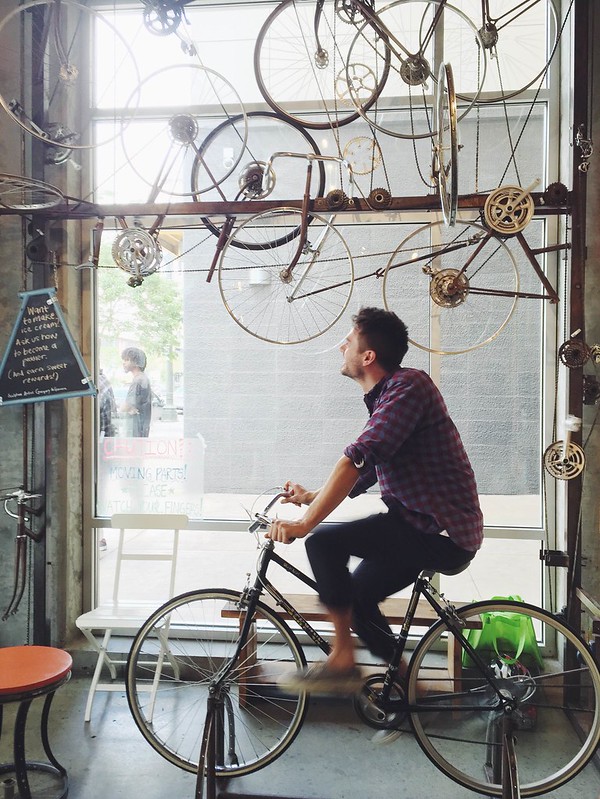Since 2010 the LADOT Bike Program has worked diligently to introduce, formalize, and refine bicycle corrals for the City of Los Angeles. We have seen huge successes in our process, from the revival of the York Boulevard commercial corridor and pedestrian space to the overcrowding of our much needed Abbot Kinney corrals. We have also tested and modified designs, beginning with U-racks, moving to the Dero Cyclestall Elite, and now a modified version of the Cyclestall that better serves cargo bicycles. We are about to embark on our largest yet deployment of bicycle corrals in Los Angeles and hereby announce a call for new applications. In the next two years, the department’s strategic plan, Great Streets for Los Angeles, calls for the installation of over 25 bicycle corrals. There are many criteria that go into corral site selection and approval, but before we explain the fine print, we wanted to take you through a tour of lessons learned and the corral history that goes into today’s revision.
Phase 1

Our very first York Boulevard Bicycle Corral was yarn bombed to mark the new year!
Our first corral on York Boulevard featured many elements that have been discontinued due to cost, functionality, and permanence. Our first design featured welded U racks that needed to be pre-assembled and lifted into place by crane. The design also featured asphalt buffers that were repeatedly damaged by cars and delivery vehicles. This design has been popular with users, as it allows a barrier-free approach to parking. The lack of barrier, though convenient, does not provide as much protection as a structure that fully separates the parking from the travel lanes, and therefore, after considering all factors, the next round of corrals was modified significantly.
Phase 2

The corral at Gjelina Take Away has been seen packed here with 18 bikes! Photo courtesy Gjelina
Our next round of corrals consisted of 11 custom Dero Cyclestall Elites. The new design, which fully separates the bicycle parking from travel lanes has sometimes been criticized by users as difficult to enter, creates a pedestrian interaction for people dismounting their bicycles, orienting the now-pedestrians towards the sidewalk and away from any conflict with moving vehicles. This setting creates a more conscientious entry and exit from the bicycle parking area, eliminating conflicts between dismounted riders and those passing as well as driver-bicycle conflicts. Beyond this change, the new corral design utilizes rubber wheel stops, durable buffers against parking cars and reflective flexible delineators that make the corral more visible to approaching vehicles, especially at night.
These corrals are installed in Atwater Village, Venice, Cypress Park, North Hollywood, the Arts District, Eagle Rock, Larchmont Village, Westood Village, and (coming soon!) Downtown’s Historic Core. This round of installations presented rich feedback on corral placement in relation to travel lanes and bicycle facilities, user density, and the dynamics of nearby bicycle friendly neighborhoods.
Some lessons learned in this phase include:
- need for high pedestrian and bicycle activity
- preferred adjacency to bicycle facility (bike lanes, buffered bike lanes, or sharrows)
- pedestrian scale street settings provide comfortable environment for people parking their bicycles
- better entry to corral to accommodate cargo bicycles
- bicycle friendly businesses and high turn-over services that attract people on bikes (like cafes) serve as ideal sponsors for corrals
- dense, pedestrian-heavy areas with limited parking or sidewalk area are ideal locations for corral placement
- most corrals necessitate two parking spaces for clearance and visibility reasons
Taking these lessons into consideration, we went back to the drawing board again for our next corral order, incorporating both user and safety considerations.
Phase 3
Our next phase will feature the custom Dero Cyclestall Elite, further modified with shorter side arms that allow for ample entry space. We’ve also ordered 5 corral extenders, allowing sponsors to select a longer version of the corral, expanding parking capacity from 14 spaces (as seen above these corrals can actually fit up to 18 bicycles) to 20 (24) spaces. The additions fall within the two-parking space area, so the expanded corral does not require further parking impacts.

New Corrals await their future street!
Applying for a Bicycle Corral
We are currently looking for locations for our next corrals! If you own a business or are part of a community organization that would like to sponsor a corral, check out our corral page, FAQs, and the corral application below. All sponsors are required to sign a maintenance agreement with the City, where the partner agrees to keep the corral clean and clear of debris (corral placement restricts street sweeping). Once a corral location is preliminarily reviewed and a maintenance agreement signed, the project enters engineering design, which at times reveals other complications or reasons a corral cannot be installed at that location. If the project reaches design completion, the installation is coordinated by LADOT.
Read Full Post »














